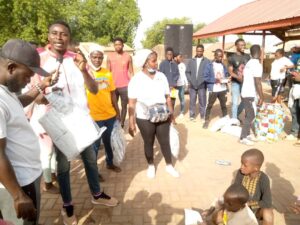GHANET engages youth, men to increase HIV self-testing in Bongo
 The Ghana HIV and AIDS Network (GHANET), has engaged youth and men in Bongo District of the Upper East region on HIV self-testing to scale up awareness of their status and help prevent the spread.
The Ghana HIV and AIDS Network (GHANET), has engaged youth and men in Bongo District of the Upper East region on HIV self-testing to scale up awareness of their status and help prevent the spread.
Mr Patrick Anamoo, the National Publicity Officer for GHANET, said health was a priceless asset that enabled individuals to appreciate the world to the fullest and meet life`s problems with ease and comfort, and it was important that the youth developed the habit of frequent self-testing to know their status.
According to him, Ghana was a signatory to the UNAIDS Goals 95-95-95, which implied that Ghana should diagnose 95 percent of all HIV-positive individuals, provide antiretroviral therapy (ART) for 95 percent of those diagnosed, and achieve viral suppression for 95 percent of those treated by 2030.
This, he noted, coupled with the need for individuals to know their HIV status and the gap created in reaching at-risk men for HIV testing, necessitated the need for self-testing, which offered privacy, confidentiality, convenience, quick results, and empowerment.
Mr Anamoo made these known during a health walk in Bongo, organized by the United Brothers Association of Bongo in collaboration with GHANET and the Bongo District Directorate of the Ghana Health Service.
It formed part of the National AIDS/STI Control Programme (NACP) being implemented by GHANET in partnership with the Ghana Health Service and the Ghana-West African Programme to Combat AIDS and STIs (WAPCAS).
The purpose of the walk was to afford the participants the opportunity to appreciate the essence of health and be educated on how to use the OraQuick HIV self-test.
OraQuick is an approved test kit that uses oral fluid to check for antibodies to HIV Type 1 and Type 2, the viruses that cause AIDS, by collecting an oral fluid sample by swabbing one’s upper and lower gums with the test device.
Through the demonstrations led by Mr Thomas Abulmoo, an Antiretroviral Therapy Nurse at the Bongo District Hospital, participants were taken through how to conduct an HIV self-test using OraQuick.
He explained that a single line on the control line of the test kit means non-reactive, which implies negative, while two lines mean reactive, which implies that there are HIV antibodies in the person’s system but does not conclude positive, and that it required one to visit the hospital for a final examination.
The OraQuick self-test and condoms were distributed to the participants.
Mr Prosper A-ura, the President of the United Brothers Association of Bongo, called on the youth to keep fit and get themselves tested to know their HIV status, adding, “health is wealth.”
Mr Donatus Adua Awine, a volunteer, said though the youth were initially hesitant to use the OraQuik for self-testing when the project was first rolled out, the same could not be said recently as it had now been embraced.
“For this quarter, we were given 600 kits to distribute, and it got finished, and we added 150 kits, and that one too is finished as of now, and this tells you the rate at which people are embracing the self-test now,” he said.
He, however, bemoaned the lack of logistics like motorbikes to reach out to the remote areas or cover up so many groups who are not in town.
So far, two individuals have been linked to care, while five people have been reported reactive, and efforts are being made for them to report to the health facility for a final examination, he added.
Source: GNA
